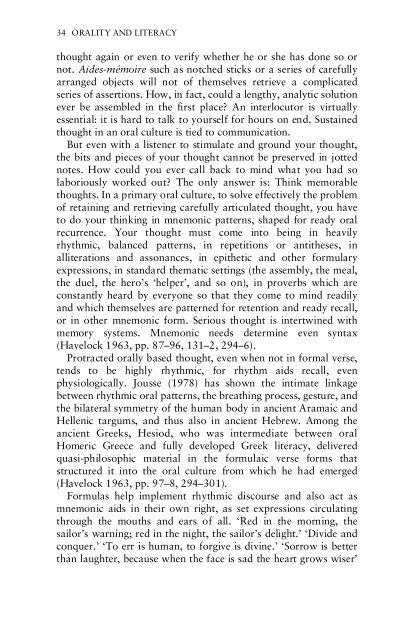Orality and Literacy: The Technologizing of the Word - Monoskop
Orality and Literacy: The Technologizing of the Word - Monoskop
Orality and Literacy: The Technologizing of the Word - Monoskop
You also want an ePaper? Increase the reach of your titles
YUMPU automatically turns print PDFs into web optimized ePapers that Google loves.
34 ORALITY AND LITERACY<br />
thought again or even to verify whe<strong>the</strong>r he or she has done so or<br />
not. Aides-mémoire such as notched sticks or a series <strong>of</strong> carefully<br />
arranged objects will not <strong>of</strong> <strong>the</strong>mselves retrieve a complicated<br />
series <strong>of</strong> assertions. How, in fact, could a lengthy, analytic solution<br />
ever be assembled in <strong>the</strong> first place? An interlocutor is virtually<br />
essential: it is hard to talk to yourself for hours on end. Sustained<br />
thought in an oral culture is tied to communication.<br />
But even with a listener to stimulate <strong>and</strong> ground your thought,<br />
<strong>the</strong> bits <strong>and</strong> pieces <strong>of</strong> your thought cannot be preserved in jotted<br />
notes. How could you ever call back to mind what you had so<br />
laboriously worked out? <strong>The</strong> only answer is: Think memorable<br />
thoughts. In a primary oral culture, to solve effectively <strong>the</strong> problem<br />
<strong>of</strong> retaining <strong>and</strong> retrieving carefully articulated thought, you have<br />
to do your thinking in mnemonic patterns, shaped for ready oral<br />
recurrence. Your thought must come into being in heavily<br />
rhythmic, balanced patterns, in repetitions or anti<strong>the</strong>ses, in<br />
alliterations <strong>and</strong> assonances, in epi<strong>the</strong>tic <strong>and</strong> o<strong>the</strong>r formulary<br />
expressions, in st<strong>and</strong>ard <strong>the</strong>matic settings (<strong>the</strong> assembly, <strong>the</strong> meal,<br />
<strong>the</strong> duel, <strong>the</strong> hero’s ‘helper’, <strong>and</strong> so on), in proverbs which are<br />
constantly heard by everyone so that <strong>the</strong>y come to mind readily<br />
<strong>and</strong> which <strong>the</strong>mselves are patterned for retention <strong>and</strong> ready recall,<br />
or in o<strong>the</strong>r mnemonic form. Serious thought is intertwined with<br />
memory systems. Mnemonic needs determine even syntax<br />
(Havelock 1963, pp. 87–96, 131–2, 294–6).<br />
Protracted orally based thought, even when not in formal verse,<br />
tends to be highly rhythmic, for rhythm aids recall, even<br />
physiologically. Jousse (1978) has shown <strong>the</strong> intimate linkage<br />
between rhythmic oral patterns, <strong>the</strong> breathing process, gesture, <strong>and</strong><br />
<strong>the</strong> bilateral symmetry <strong>of</strong> <strong>the</strong> human body in ancient Aramaic <strong>and</strong><br />
Hellenic targums, <strong>and</strong> thus also in ancient Hebrew. Among <strong>the</strong><br />
ancient Greeks, Hesiod, who was intermediate between oral<br />
Homeric Greece <strong>and</strong> fully developed Greek literacy, delivered<br />
quasi-philosophic material in <strong>the</strong> formulaic verse forms that<br />
structured it into <strong>the</strong> oral culture from which he had emerged<br />
(Havelock 1963, pp. 97–8, 294–301).<br />
Formulas help implement rhythmic discourse <strong>and</strong> also act as<br />
mnemonic aids in <strong>the</strong>ir own right, as set expressions circulating<br />
through <strong>the</strong> mouths <strong>and</strong> ears <strong>of</strong> all. ‘Red in <strong>the</strong> morning, <strong>the</strong><br />
sailor’s warning; red in <strong>the</strong> night, <strong>the</strong> sailor’s delight.’ ‘Divide <strong>and</strong><br />
conquer.’ ‘To err is human, to forgive is divine.’ ‘Sorrow is better<br />
than laughter, because when <strong>the</strong> face is sad <strong>the</strong> heart grows wiser’

















